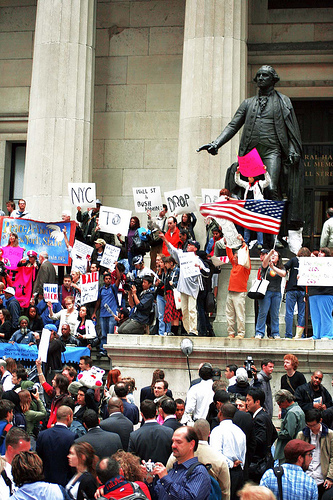Stock markets are public exchanges on which company shares, also referred to as stocks, are traded. The London Stock Exchange (LSE), the New York Stock Exchange (NYSE), the Paris Bourse, the Deutsche Boerse and the Tokyo Stock Exchange are among the best known stock markets in the world.
Stocks can be speculated on by a range of financial investors. Some of the larger types of investors include pension funds, hedge funds, investor groups and insurance companies.
One of the main stock market trading risks is that you might lose your investments in a stock market crash. Stock market crashes, the most famous of which triggered the Great Depression in the 1930s, are relatively uncommon.
Of course, it should always be remembered that these crashes can be hard, if not impossible, to predict. The financial crisis that began in 2007 took many by surprise and wiped out many investment portfolios. Even though stock market crashes are rare, they can be devastating when they do occur.
One of the ways in which you can seek to limit the risk of losing your investments to a stock market crash is to invest only in low-risk investment companies.
A low-risk company is one that has had a steady financial performance over many years, has paid out dividends for many years without interruption and has a credible strategy for the future. Utility companies often fit into this category.
There is always an element of judgement to be exercised in choosing a low-risk investment. Risk, of course, can never be wholly eliminated, as looking at the past is never an entirely accurate method of anticipating what may happen in the future.
If you wanted high risk investment then you could try financial spread betting with a company like Financial Spreads or IG Index.
Spread betting is considered high risk because your trades are leveraged. In short, your profits are magnified but so are your losses.
In short, spread betting involves a high level of risk to your trading capital and is not appropriate for all classes of investor. Before you start trading, make sure you are fully aware of the risks involved. Always ensure that you only speculate with money you can afford to lose. Where necessary request independent advice.
Stock market trading risks are sometimes divided into systemic and non-systemic. Systemic risks are those that affect an entire market. External events such as interest rate announcements or political events such as US presidential elections, war or regional instabilities often affect traders’ decisions across an entire market.
A recession, for example, can make it harder for many companies to sell their goods and services, regardless of what these are.
Non-systemic risks are related to an individual company’s performance and financial health. Non-systemic events that can affect a company’s share price can include its financial results announcements, executive board exits/appointments or product issues.
A traditional method of diminishing risk is stock diversification. In colloquial terms, this is equivalent to putting your eggs in different baskets.
If you are exposed to a high-risk stock in one of your investments, you can seek to offset it by investing in a low-risk stock that may generate profit more slowly, but in your opinion, more surely. A high-risk stock tends to generate profits quicker but with a greater probability of losses.
Diversification does not mean that your trading will be risk free; if all of the sectors which you are trading go against you, you may of course lose even more money.
A leading financial writer based in London’s financial heartland. Peter Jones is a seasoned commentator on the futures and spread betting markets.

Stock Trading Money Management software for STRESS FREE share trading For all that download or have access to MetaStock format data. For both beginners and s…
Video Rating: 4 / 5

